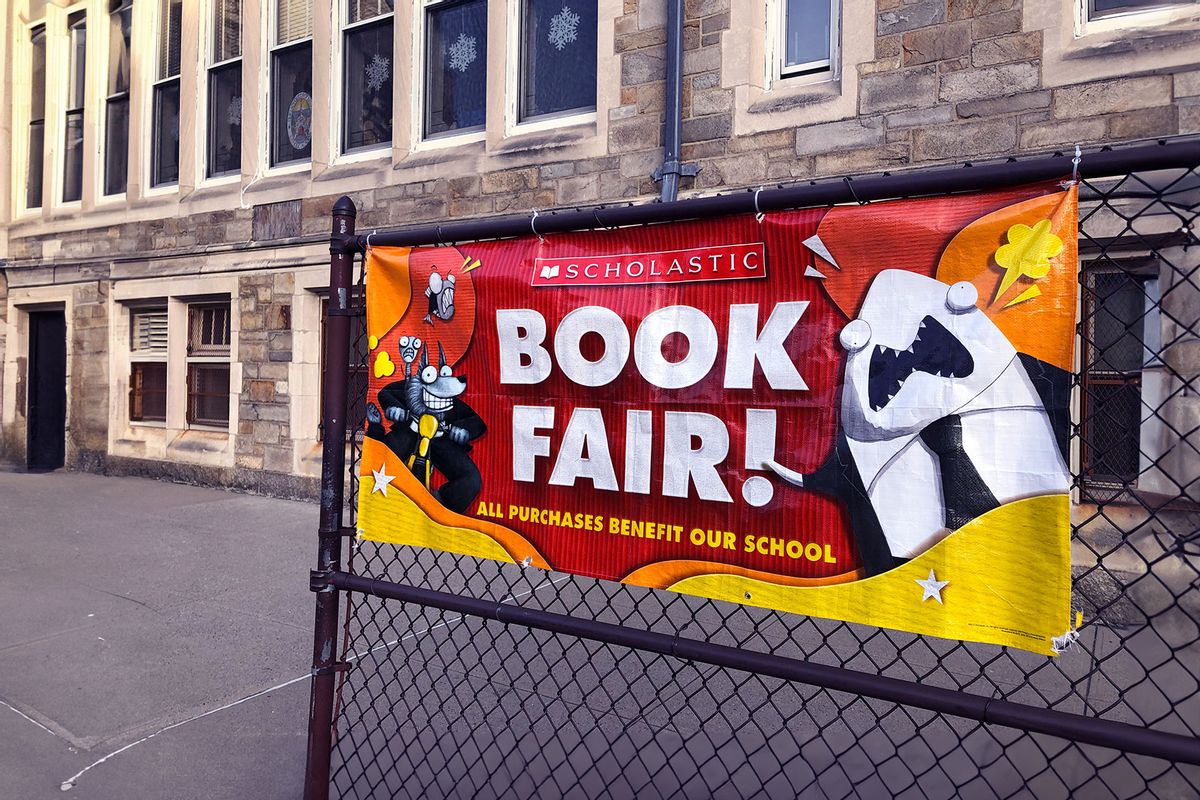Hey, right wing ghouls! Hands off the Scholastic book fair

Regular readers will not be surprised to know that my childhood identity was that of Book Girl: The kid whose nose was forever in a book. Who read all the “Little House” books, including the one Almanzo Wilder. Who knew the difference between the Newberry Medal and Newberry Honor. Who read every book in the classroom library, and remembered the call numbers of favorite volumes in the school library. Who, when hospitalized for asthma (a common condition among Book Kids), asked only for concerned relatives to retrieve a stack of books from home.
To the tribe of kids who keep paperbacks in their lunchboxes, the Scholastic Book Fair was akin to a religious holiday. I’d bring home the purchase form and negotiate with my mother over how many books I could buy on our strict family budget. Return to school with the form and a handwritten check neatly folded into an envelope with my name. After an interminable wait, which was actually just a few weeks, the books would show up after lunch, piled on our desks as if by magic. Everything from stone-cold classics like “Where the Red Fern Grows” to the latest “Babysitter’s Club” release, to be devoured in a day.
A lot of people feel nostalgia for book fairs, as I learned when a crowd showed up at the “Grown-Ass Book Fair” hosted at my partner’s Philadelphia record store in May. It’s why I’m not surprised there’s a growing rumble of outrage at news reports that Scholastic has been giving into the far-right’s anti-reading pressure campaign.
Last week, Judd Legum at Popular Information reported that “Scholastic is facilitating the exclusion of books that feature people of color and/or LGBTQ characters.” They’ve shunted books featuring characters who aren’t straight or white into a separate category to give schools “the option to exclude the entire set of books from the book fair.” In a dark twist, the category is called “Share Every Story, Celebrate Every Voice,” though its purpose is to allow schools to banish books that suggest that characters that aren’t straight white men have stories worth reading.
Want more Amanda Marcotte on politics? Subscribe to her newsletter Standing Room Only.
Some of the books targeted for censorship include “Justice Ketanji: The Story of Us Supreme Court Justice Ketanji Brown Jackson,” “Change Sings” by National Youth Poet Laureate Amanda Gorman, “Alma and How She Got Her Name,” and “Because of You, John Lewis.” Despite all the right-wing hysteria about “pornography” used to justify book banning, what clearly links these books has nothing to do with sex. No, what’s offensive to the right is the possibility that a white kid might learn that some other people exist who are not white.
Scholastic’s argument is that red states are passing book bans that are both draconian and incredibly vague. “Critical race theory” is banned in some places, for instance, but what Republicans mean by that phrase is not defined. As Greg Sargent of the Washington Post points out, Iowa bans schools from stocking books with any “sex acts,” without explaining what that means. (As any Regency romance fan can tell you, after all, a mere brush of the hand can be quite the sex act!)
Of course, the widespread understanding is these laws are meant only to suppress books with non-white or non-straight characters. To the censors, a gay couple kissing is a “sex act,” but a straight couple is merely “normal.” The bans also operate under the unspoken assumption that “white” is not a race, but a character merely being Black is “critical race theory.”
Scholastic, as Legum reports, is reacting to a sustained pressure campaign from the right, which routinely accuses the company of flooding “our schools and libraries with books that promote dangerous and anti-Biblical ideas.” In doing so, Republicans give lie to their ludicrous claims that book banning is about “parents rights.” This isn’t a classroom or library, where, in theory, a kid could access a book forbidden by her parents. Book fairs are old-fashioned capitalistic marketplaces. Ask any nerd who wheedled her parents for a little more cash to buy books: What you get from Scholastic is what your parents are willing to buy you.
This point came up repeatedly in my conversations with parents and educators who are resisting the book banning frenzy unleashed by Moms for Liberty and other right wing groups: These people are trying to strip away parents rights, not protect them. The goal is forcing every other parent to adhere to their fundamentalist fantasy of a world where everyone is white, straight, and conformist.
“I do believe parents can decide for their own child, not the entire school district,” explained a teacher and a parent, who wished her name withheld for work reasons.
Membership in the GOP tribe means refusing to criticize people that want to limit kids to “Christian Fables About How Homos Are Evil” or whatever else Kirk Cameron is selling.
Elizabeth Mikitarian, a retired kindergarten teacher who founded Stop Moms for Liberty, argued that “the entire community” should not lose access to a book because a single parent or a single group doesn’t “approve of something.”
“Children come to school and whatever they are, whatever they have going on in their lives that that comes into the school room door with them,” Mikitarian said. Because of that, the anonymous teacher argued, it’s important “all readers can find something that they can relate to.” She also argued that reading books about people not like yourself helps kids develop empathy and understanding.
Want more Amanda Marcotte on politics? Subscribe to her newsletter Standing Room Only.
My personal experiences certainly reflect what these teachers told Salon. It’s not just bigger categories like race or gender or sexual orientation. Being a kid with divorced parents, reading books about divorce helped me feel safer. Being a brainy weirdo, I was drawn to books — such as “The Witch of Blackbird Pond” — that depicted girls who are marginalized for being too clever or independent. But I also enjoyed books about people I had less in common with, at least on the surface. But in the process, I learned how much I still shared with people who had different life experiences.
And, crucially, being a voracious reader also meant I was a precocious reader. One way my mother and teachers could keep me from being bored was by letting me read books above my grade level. The Scholastic book fair was clutch on that front, especially when I was still too young to go to the bookstore by myself.
Reading over these quotes and my own words shows why this has become such a contentious political issue. Kids learning that it’s okay to be different? Girls developing intelligence and ambition? Students feeling empathy for people not like themselves? Those are all things that Republicans, as they become increasingly fascistic, oppose. Everyone agrees that books do these things for kids. It’s just that the right doesn’t want kids to develop open minds and kinder hearts.
I learned this in a heart-breaking way recently, in a conversation with my mother, a loyal Republican. I told her about my investigative report (which natch, she hasn’t read) about the fight between pro- and anti-book banning factions in Bucks County, Pennsylvania. She feigned ignorance of the entire book ban debate. I’m guessing she didn’t want to hear criticism of her political party for doing something deeply wrong and un-American. It bummed me out. This is the same woman who let me read almost anything I wanted as a kid. In the pre-Fox News era, even Republicans thought it was a good thing when kids liked to read. But such is partisan polarization these days. Membership in the GOP tribe means refusing to criticize people that want to limit kids to “Christian Fables About How Homos Are Evil” or whatever else Kirk Cameron is selling.
This stubborn refusal to admit “the libs” might be right and Team GOP might be wrong, of course, is gross — but the ultimate victims are kids. The world looks a lot different than it did in the 80s, but I suspect Book Kids are still with us. They still need the rush from opening a brand new book and smelling the ink on the page. They still need to get lost in the stories of other people, both real and fictional, that allow them to imagine a world outside the dull parameters of childhood. Quashing those kids and their imaginations is just another reminder that it’s not “family values” or “morality” that motivates our modern GOP. It’s the base sadism of people like Donald Trump, who treats books like hostile rodents that will bite him if he holds them too closely.


